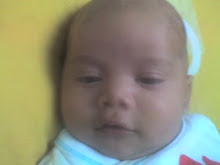Ika_suzuka: I choose to give my baby (Aiman Hakim), breastfeeding...sometimes I also give him formula feed. I chose nan1 for Aiman.. it's because sometimes i feel not enough milk to feed my baby. I know, breastfeeding is really good for my baby. For your information, I'm working. I feel very happy because my colleague also breastfeeding. She very powerful motivator...although she said breastfeed not enough.
Ika_suzuka: Can you help me and my friend....how to make enough to feed my baby????..
News....
YOUR report "Toxins in mother's milk" (NST, May 11) was badly timed and in bad taste. Bad timing because it is old news rehashed to appear on Mother's Day. And in bad taste because it undermines the confidence of millions of women who have lovingly nursed their babies with this "Cinderella milk".
Medical experts have known for decades that trace amounts of chemicals, including dioxins, can be transferred from a mother to a nursing infant. However, the concentrations transferred through breastfeeding are well below the levels that might cause adverse health effects.
Some studies have demonstrated subtle effects in children of mothers exposed to toxins, namely neuro-developmental delays and neuro-behavioural changes. But the effects are, in all but one study, attributed to exposure of the unborn child through the placenta rather than through breast milk. Several studies that looked at the effects of prenatal PCB exposure on cognitive performance, found that breast-fed children out-performed formula-fed children.
Despite the high PCB and dioxin levels transferred via breast milk, breastfeeding seemed to have a beneficial effect on the neuro-developmental status compared with formula feeding. It is postulated that the myriad of hormones and biological factors found in breast milk may have a protective effect on normal neurological development and mitigate the deleterious effects of prenatal exposure.
The point that needs to be driven home is not whether women should now reconsider their options of breastfeeding or bottle-feeding. That breastfeeding is superior and preferable is clear and unequivocal. Man's environmental sins must not now deprive our very young of the benefits of mother's milk. Our back-to-basics attitude towards medicine would suggest that the most effective way of addressing this problem is to limit environmental pollution to prevent these chemical pollutants from entering mother's milk in the first place. The banning and phasing out of various chemical toxicants has resulted in reduced emissions of pollutants in the environment.
According to a 1998 report by the World Health Organisation (WHO), concentrations of dioxin in breast milk are down by at least 50 per cent within the past 10 years in almost every region for which suitable data exists and are continuing to decline.
In 1990, the Innocenti Declaration on the Protection, Promotion and Support of Breastfeeding "called on all governments to act and create an environment enabling all women to practise exclusive breastfeeding from birth to 4-6 months and to continue breastfeeding with adequate complementary foods up to 2 years".
This international declaration, supported at the highest level of governments, empowers women to give their babies the healthy start they deserve, to survive and thrive in a world that is both mother- and baby-friendly. And since more and more babies start their lives in hospital, the global baby-friendly hospital initiative was mooted, where each of the "10 steps to successful breastfeeding" developed by Unicef and WHO were applied. The Health Ministry has been exemplary in its pursuit of the above accreditation. All public hospitals and a few private and university hospitals have been recognised as baby-friendly hospitals.

No comments:
Post a Comment